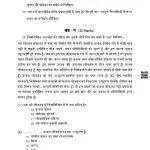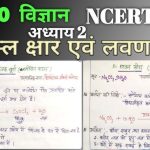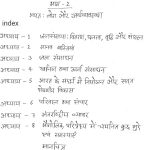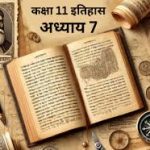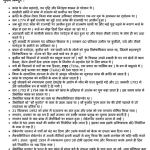History is an important subject for 11th class students. It covers a wide range of topics that help students understand the past and how it shapes the present. If you’re preparing for your 11th class history exam, it’s essential to have the right study materials to make the learning process easier. Here, we will provide you with 11th class history notes in Hindi, which will include lecture notes, study guides, textbook summaries, flashcards, class handouts, research notes, annotated readings, homework solutions, exam preparation materials, lab reports, mind maps, practice quizzes, sample problems with solutions, and vocabulary lists.
Lecture Notes:
Lecture notes are a great way to summarize what you have learned in class. They should include key points, important dates, and significant events that are covered in your history syllabus. Make sure to write down any additional points or insights shared by your teacher, as they could help during exams. When writing your lecture notes, use simple language and bullet points to organize information. This makes it easier to revise later.
Study Guides:
Study guides are essential for exam preparation. They help break down large amounts of information into smaller, more manageable sections. A good study guide will highlight the most important topics from your textbook and lecture notes. You can create your study guide by focusing on important chapters, dates, and events. Include brief explanations of each topic, and make sure to review your study guide regularly to reinforce your learning.
Textbook Summaries:
Textbook summaries are condensed versions of the chapters in your history textbook. They help you get an overview of each chapter without having to read the entire text. For each chapter, write a summary that includes the main points and important events. A textbook summary should be concise but informative, so you can use it as a quick reference when studying.
Flashcards:
Flashcards are a great tool for memorization. Write down key terms, dates, or events on one side of the card, and their definitions or explanations on the other side. You can use flashcards to test your memory and recall important facts quickly. These are especially useful when studying for exams, as they help reinforce your understanding of key concepts.
Class Handouts:
Class handouts are additional materials provided by your teacher that can help you understand specific topics in more detail. These may include diagrams, maps, or charts that illustrate important historical events. Review the class handouts carefully, and make sure you understand how they relate to the topics you are studying. You can also use these handouts to clarify any doubts you may have.
Research Notes:
Research notes are created when you gather information from external sources, such as books, articles, or websites. These notes can help you gain a deeper understanding of the topics you are studying. When making research notes, be sure to cite your sources and focus on the most relevant information. This will help you later when writing essays or preparing for exams.
Annotated Readings:
Annotated readings involve reading your textbook or other sources and adding notes or comments to clarify difficult concepts or highlight important information. This will help you engage with the material in a more active way. Use a highlighter to mark key passages and write brief notes in the margins to explain them. This technique can improve your comprehension and make revising easier.
Homework Solutions:
Homework solutions are essential for reinforcing what you have learned in class. When completing your homework, make sure to check your answers and understand the correct solutions. This helps you identify areas where you may need more practice. If you are unsure about any problems, ask your teacher or peers for help. Reviewing your homework solutions regularly will improve your understanding of the subject.
Exam Preparation Materials:
Exam preparation materials are critical for achieving good results. These materials include past exam papers, model questions, and sample papers. By practicing these questions, you can get familiar with the types of questions that might appear in your exam. Exam preparation materials also help you manage your time during the exam and improve your answering techniques.
Lab Reports:
While history is not typically a subject that requires lab reports, some topics may include fieldwork or visits to historical sites. In such cases, lab reports are used to document your findings. A lab report should include an introduction, methodology, observations, and conclusions. Be sure to organize your report clearly and include any relevant data or photographs.
Mind Maps:
Mind maps are visual tools that can help you organize and connect different pieces of information. Create a mind map for each chapter or topic, starting with the main theme in the center. Branch out with related ideas, dates, and events. Mind maps make it easier to understand the relationships between different historical events and can help you visualize the flow of history.
Practice Quizzes:
Practice quizzes are short tests that help you assess your understanding of the material. These quizzes can be found in textbooks, online resources, or created by your teacher. By taking practice quizzes, you can identify areas where you need more study and boost your confidence in your ability to answer exam questions.
Sample Problems with Solutions:
Sample problems with solutions are a great way to practice answering questions. These problems can be found in your textbook or other study materials. Work through each problem carefully and compare your answers with the solutions provided. This will help you develop your problem-solving skills and improve your exam performance.
Glossaries or Vocabulary Lists:
A glossary or vocabulary list contains important terms and their definitions. These lists are particularly helpful when studying history, as they include key terms such as events, names, and dates. Make sure to review your glossary regularly to ensure you are familiar with the terminology used in your studies.
By using all of these materials, you can improve your understanding of history and prepare effectively for your 11th class exams. Be consistent with your study habits and practice regularly. Remember to break your study sessions into smaller chunks to avoid feeling overwhelmed, and always ask for help when needed. History is an interesting subject, and with the right resources, you can excel in your studies.



